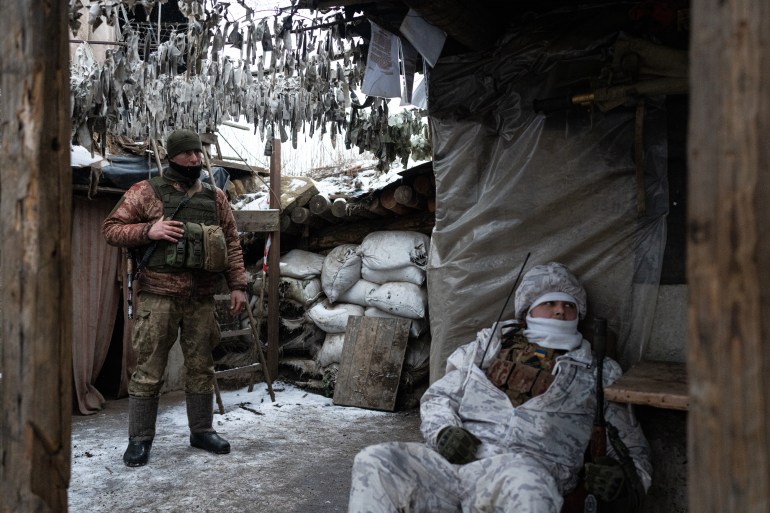French President Emmanuel Macron discussed the Ukrainian crisis on Saturday with British Prime Minister Boris Johnson and NATO Secretary General Jens Stoltenberg before visiting Moscow and Kiev, while German Chancellor Olaf Schulz visited Washington on Monday to confirm his country's support for Ukraine.
The French presidency explained that the two phone calls with Johnson and Stoltenberg were "in the context of ongoing consultations between allies on the tension between Ukraine and Russia."
Macron and Stoltenberg stressed "the need to continue to work to seek, through dialogue, a way to reduce tension, in light of unity and full respect for the fundamental principles of European security and state sovereignty," according to a statement by the Elysee Palace.
Macron will meet with Russian President Vladimir Putin on Monday in Moscow, and Ukrainian Volodymyr Zelensky next Tuesday in Kiev in an effort to resolve the crisis.
For his part, Boris Johnson briefed the French President on the results of his visit to Kiev this week and the content of his recent talks with Putin, according to the Elysee.
Anticipation and readiness on the Ukrainian side for any Russian move (Anatolia)
accusations and moves
Westerners accuse Moscow, which is massing tens of thousands of soldiers on its border with Ukraine, of preparing to invade this country, which Russia denies, demanding in return that it guarantee its security.
In a related context to diplomatic moves, German Chancellor Olaf Schulz will visit Washington on Monday, which will be his first since taking office and an opportunity to remove the ambiguity around the support of the German ally in the Ukrainian crisis.
The 63-year-old Social Democrat - who became chancellor to succeed Angela Merkel two months ago - will discuss with President Joe Biden a number of issues, especially the tense situation in Ukraine.
The German weekly Der Spiegel said that Germany's chief executive should expect a reprimand.
"We can certainly expect Joe Biden to urge the German chancellor to be more firm with Moscow," she wrote.
She added that Biden would "understand once again that the Nord Stream 2 gas pipeline" would die if Putin attacked Ukraine."
Schultz announced his refusal to deliver weapons to Ukraine (Getty)
Positions and controversy
Olaf Schultz sparked controversy in recent weeks after he announced his refusal to deliver weapons to Ukraine, and declined to clarify his position on the fate of the controversial gas pipeline, before agreeing to include it in the list of targets for retaliatory measures in the event of a Russian attack.
Germany has long been the main promoter of this pipeline, which increases the ability to import Russian gas and is vital to powering Europe's largest economy.
This project - which was completed but not yet operational - is supported by the Social Democratic Party and the German opposition as well, and the US ally did not look with satisfaction at contradictory statements about Russia issued by Berlin.
After the French president, Schultz will also visit Kiev and Moscow in mid-February.
The Ukraine crisis has put Germany in an awkward position, as it relies entirely on the United States for military protection, and since the end of World War II, transatlantic relations have been a cornerstone of its foreign policy.
Ukrainian forces on the border with Russia (Getty Images)
Messages and anxiety
In turn, Johann Fadevol, an expert on international issues in the conservative Christian Democratic Union, told Agence France-Presse that he had received emails from Washington confirming that it was "very concerned about German foreign policy."
Besides its dependence on gas, Germany also maintains close economic ties with Russia, which leads it to be more cautious about possible sanctions against Moscow.
During her 16-year rule, Merkel - who was once described as the "leader of the free world" during Donald Trump's turbulent tenure - maintained good relations with the United States, but she did not hesitate to defend the Nord Stream 2 project. 2) The dialogue with Vladimir Putin.
When he received the chancellor on her last visit to the White House last July, Biden said, "Big friends can have disagreements."

